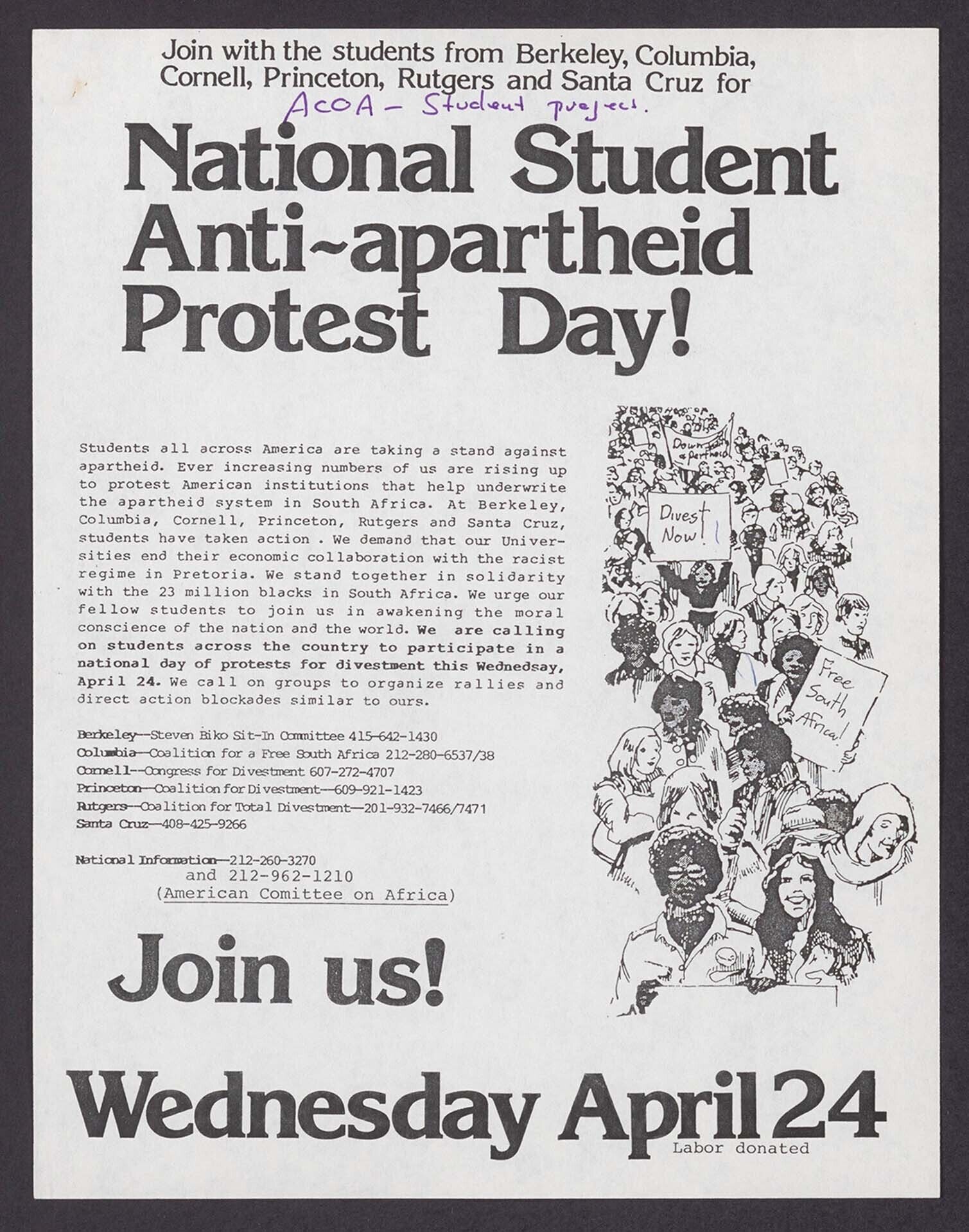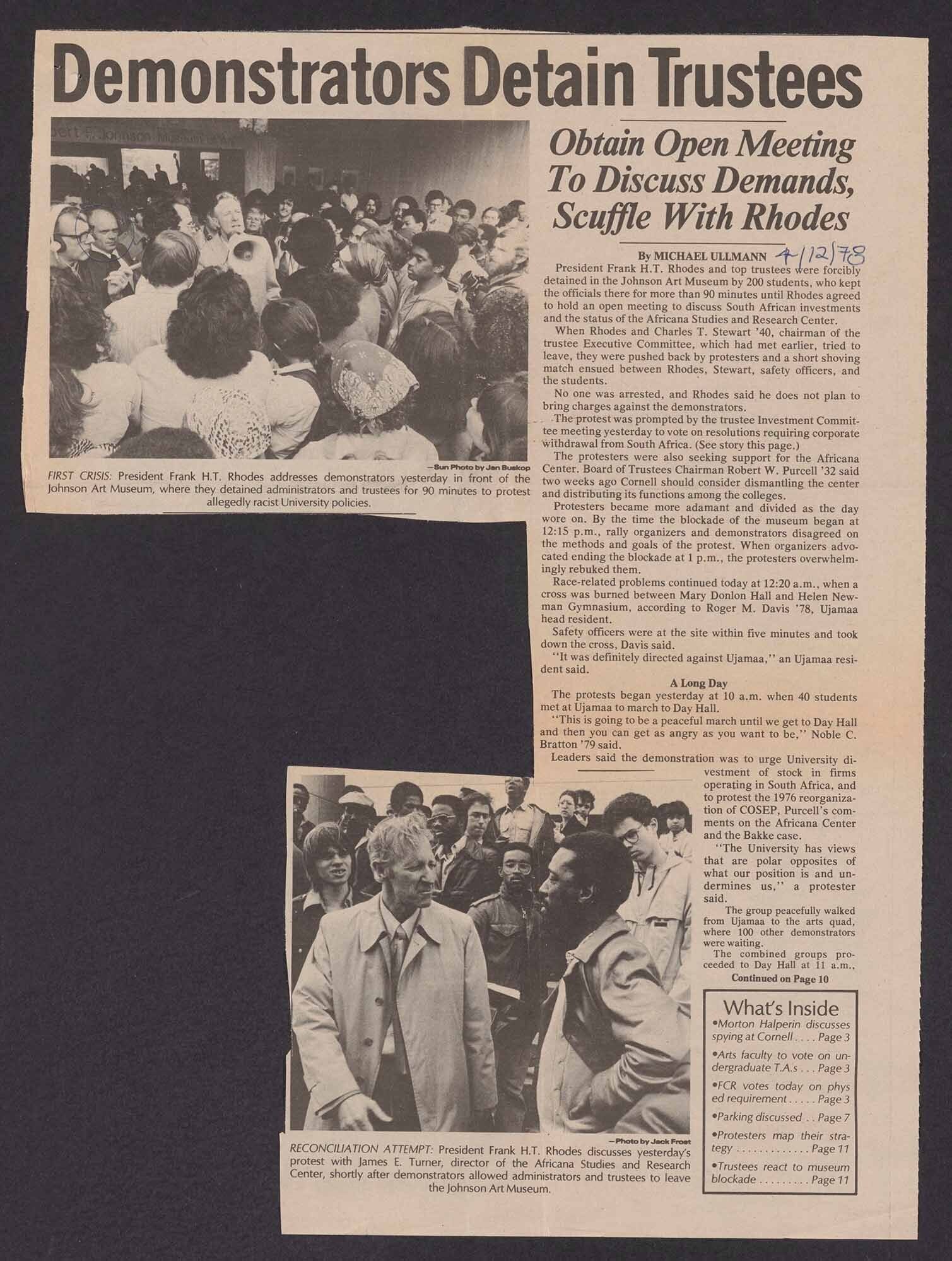Rally against racism: The student Anti-Apartheid Movement in the United States
On 14 September 1991, 26 South African trade unions and government leaders signed the National Peace Accord; an agreement aimed at reducing the ongoing political violence in South Africa during the country's transition from apartheid to a democratic society. The accord was signed by all major political parties such as the South African Government, represented by the then-President, F. W. de Klerk, the African National Congress (ANC), The Inkatha Freedom Party (IFP) and the South African Communist Party (SACP), preparing the way for multi-party negotiations for peace.
The triumph of this moment represented the culmination of nearly half a century of struggle against racial oppression by South Africans and many across the world who organised in solidarity with them. AM’s second module of the American Committee on Africa contains extensive ephemera, posters, newsletters and official papers and records pertaining to the spread of awareness of African struggles and the international support for anti-apartheid movements in Africa and America.
In particular, Series 2 of ACOA’s “front files” documents the strategic escalation of pressure on American companies, state governments and educational institutions to divest their stocks and shares from racist structures in South Africa in what was termed the Divestment Campaign; the promotion of imposing a financial boycott on South African business in order to urge the South African government to reconsider its stance on reform. Throughout the 1970s and 80s, the role of students from American colleges and universities in the campaign for sanctions on the apartheid regime is thoroughly documented.

Material sourced from Amistad Research Center, New Orleans, LA
The international outrage provoked by the Soweto Uprising, a student-led protest in Soweto, South Africa in 1976 that resulted in the injury and deaths of hundreds of schoolchildren, inspired a wave of student activism on university campuses. By 1978, the Harvard-Radcliffe Southern Africa Solidarity Committee had been established, with subsequent chapters forming at the University of Massachusetts Amherst and Brown University. Similar groups emerged at institutions such as Howard, Columbia, Yale, Stanford, Berkeley and McGill. The American Committee on Africa distributed national student newsletters, which raised the profile of the protests and detailed the rallies, sit-ins and student-led conferences aimed at pressuring the boards of large institutions to divest.
Columbia and Cornell universities were hubs of campus anti-apartheid activism, with university trustees being confined by protestors at Herbert F. Johnson Museum of Art on Cornell Campus and students occupying Hamilton Hall at Columbia for more than a week. During the protest at Columbia, they received public support from political figures such as U.S. presidential candidate Jesse Jackson, South African Archbishop Desmond Tutu, and Washington, D.C. Mayor Marion Barry.

Material sourced from Amistad Research Center, New Orleans, LA
In a paper by the American Committee on Africa in 1986, a reported 111 schools had either partially or completely divested their assets from South African companies, totalling $3,684,160,821 being withheld from the apartheid regime. The news articles, newsletters, promotional materials and ACOA reports generated by student-led anti-apartheid groups reflect the growing global consensus that apartheid needed to be dismantled. Their public education initiatives also made both the university community and the broader public more informed, shaping their attitudes and responses to social and political issues decades later.
ACOA records relating to these campaigns and initiatives are now available within Module II of AM’s resource American Committee on Africa: Anti-Apartheid Movements and Democracy.
For more information on American Committee on Africa: Anti-Apartheid Movements and Democracy, including free trial access and price enquiries, please email us at info@amdigital.co.uk. The documents quoted in this blog are available open-access for 30 days
Recent posts

This blog examines how primary sources can be used to trace the impact of young voices on society, particularly during pivotal voting reforms in the UK and the US. Explore materials that reveal insights into youth activism, intergenerational gaps, and societal perceptions, highlighting their interdisciplinary value for studying youth culture, activism, and girlhood across history.

Meu Mapa, by Atlas Weyland Eden, is a short piece of historical fiction inspired by digitised archival maps in AM databases, and written as part of the Imagining History UK programme.
